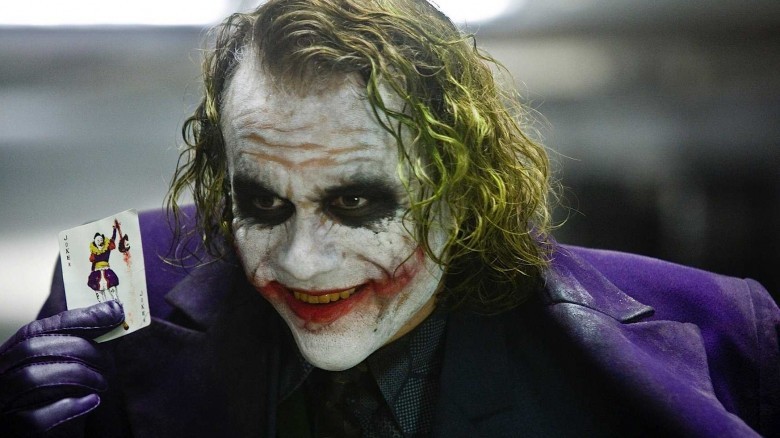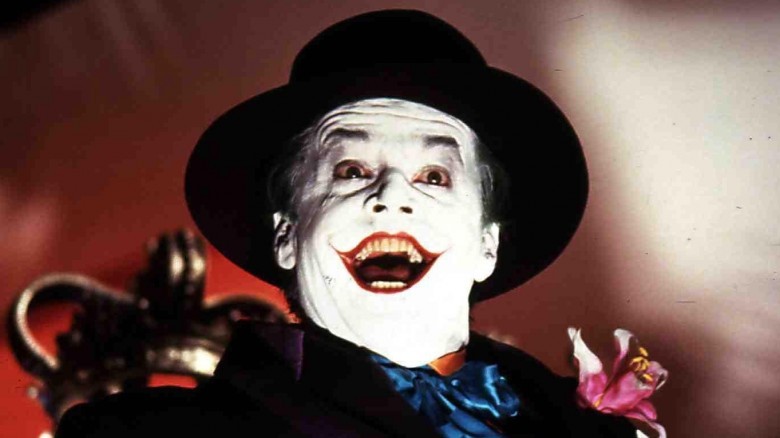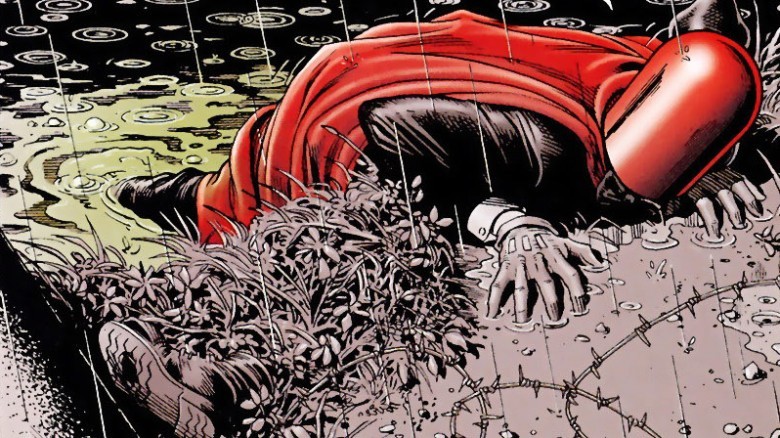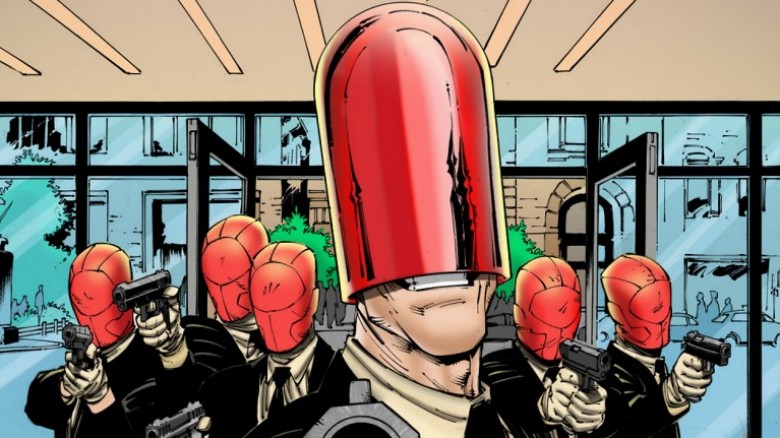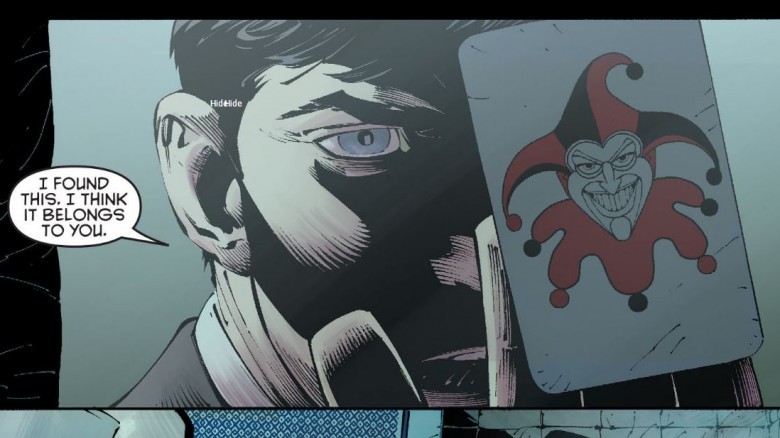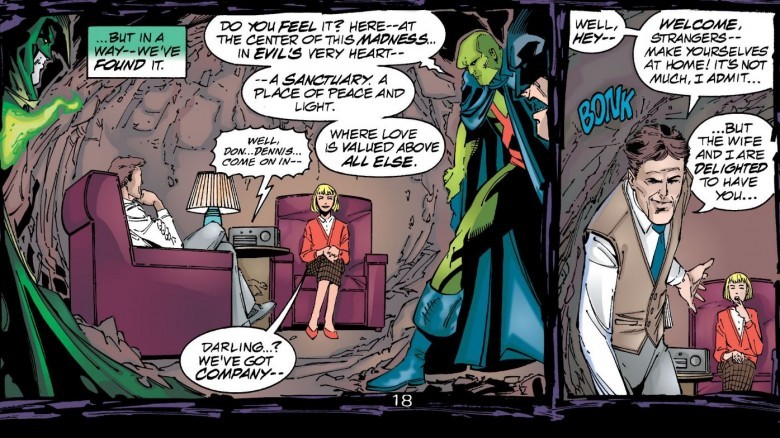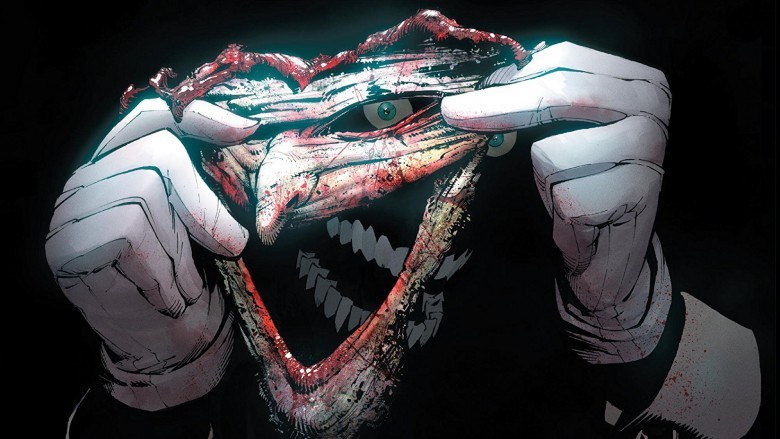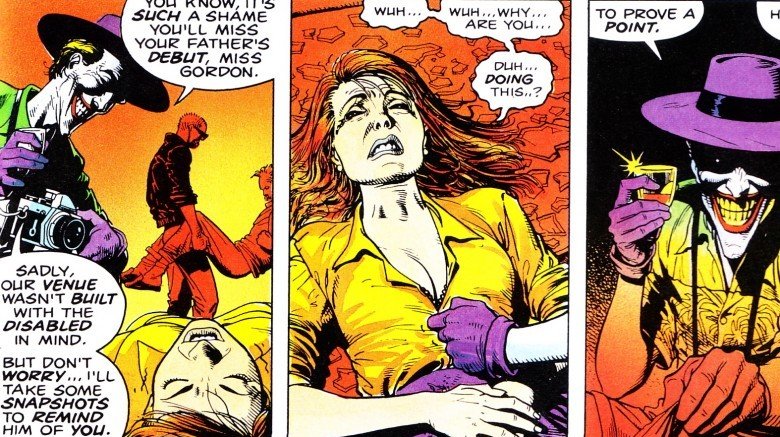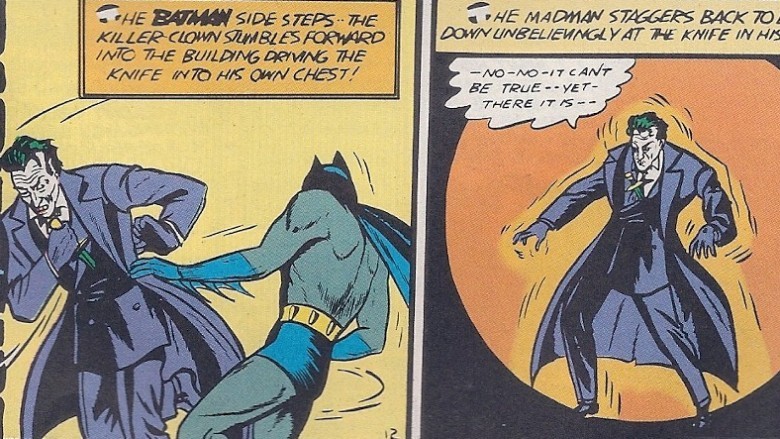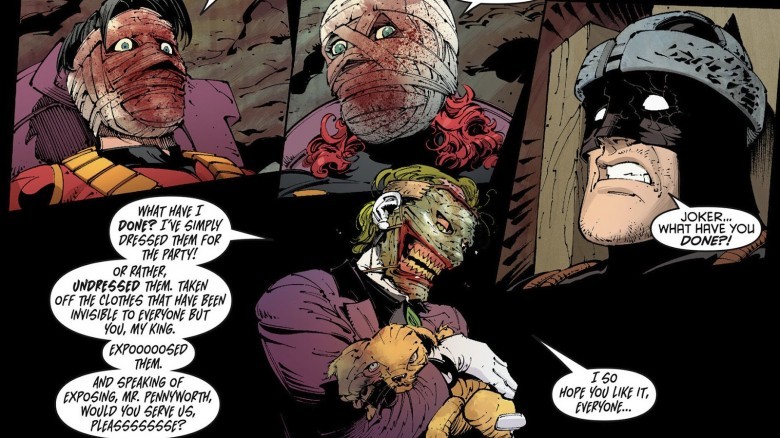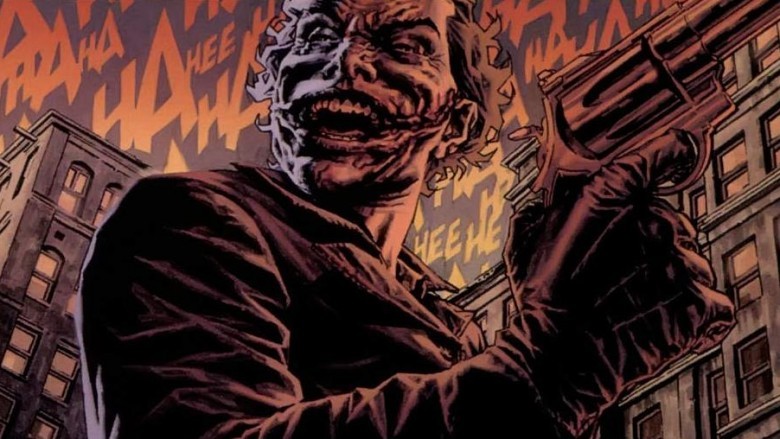The Untold Truth Of The Joker
The Joker is one of the most captivating and frightening comics villains ever brought to life. Every actor portrays him differently, and every writer portrays him differently in the comic books. Because of these different portrayals (and the simple fact that the character debuted over 75 years ago), there's a lot that most people don't know about the Joker—from whether he knows Batman's secret identity to whether he's actually crazy. The facts might be hard to find, but they're out there—and with that in mind, here's our handy guide to the untold truth of the Joker.
His real name remains unknown
One of the keys to the Joker's enduring intrigue is the fact that his real identity, such as it is, remains unknown. There are some possible clues to his origin, but Batman still doesn't know who his arch-nemesis truly is. Considering how much of Batman's crimefighting involves understanding the background and psychology of his foes, this confusion is extra infuriating for the Caped Crusader.
To further muddy things for the readers, Joker has gone by many names. Some of his alleged origin stories have him named simply "Jack," while the Joker himself has used aliases as obscure as Oberon Sexton to as obvious as Joe Kerr. The villain was given a real name in the 1989 Batman film, however: Jack Napier. In this iteration, Joker is a gang thug before being transformed, and the Batman: Mask of the Phantasm movie copied this to some extent. However, neither movie is canonical to the comics—in fact, in the 1989 Batman, Joker actually killed Bruce Wayne's parents, creating a weird age disparity between the two foes.
His origin is also unknown
The closest thing we have to an official Joker origin is a sad tale he shares in Alan Moore's famous The Killing Joke comic. In that story, Joker describes himself as a husband to a pregnant wife he can't support due to his failed career as a comedian. He's talked into helping some criminals break into his old workplace, and his wife ends up dying due to a freak accident with a baby bottle warmer, but Joker still helps the criminals, and they convince him to wear a Red Hood mask during the robbery. Batman foils their crime, and a seriously spooked Joker ends up falling in a vat of chemicals, which transforms him into the familiar clown.
It's pretty captivating stuff, right? It's also probably a complete lie. As Joker says in that same story, sometimes he remembers his past one way and sometimes another, because if he's going to have a past, it may as well be multiple choice. This is echoed by later Batman stories that tell the origin differently: in one story, Batman remembers Joker as a simple thug with no wife; in another, he's the leader of an anarchic group known as the Red Hood Gang. And, of course, this past as multiple choice was echoed in the Dark Knight movie, as Heath Ledger's Joker tells different stories about how he got his scars.
He may have been Batman's first foe
Not content to merely tell awesome new adventures about the Caped Crusader, DC Comics writer Scott Snyder has also made powerful changes to Batman's origin and mythology. This has included exploring a villain that may or may not be Bruce's long-lost brother, showcasing an entire year in which Batman dealt with the Riddler having taken complete control of Gotham City—and hinting that the Joker was Batman's first foe.
Batman encountered the Red Hood gang and their mysterious leader before he'd even adopted the Batman persona, and Snyder has offered tantalizing clues that this gang leader might be the Joker—but there are also some mysteries. This leader references remembering Bruce's parents being murdered, which may hint to an age difference that other comics never mention. There's also the fact that Bruce gets a DNA sample from the leader, but as far as we know, he's never been able to connect that sample to the Joker. Snyder maintains the ambiguity that the Joker is most known for, and a background that—once again—we can take or leave as his "true" origin.
He doesn't want to know who Batman is
Most of Gotham's criminals want to know who Batman really is under that mask. Sometimes, this is motivated by simple curiosity, and sometimes it's a matter of brutal pragmatism: as Bane illustrated, once you know who Batman is, you can ambush him at home at the worst possible time. Joker is considered Batman's main foe, which is why it's that much more surprising that he doesn't want to know who Batman actually is.
Different writers have explored this in different ways. In Grant Morrison's Arkham Asylum: A Serious House On Serious Earth, Batman willingly enters Arkham to secure freedom for the doctors and staff after the inmates take over. When a villain suggests taking off Batman's mask to see his "real face," a disappointed Joker replies with "Oh, don't be so predictable, for Christ's sake! That IS his real face!"
He's had ample opportunities to find out, too, from knowing Jason Todd's identity before he killed him to being in Arkham when an unmasked Batman was running around during Batman: R.I.P. In the final issue of Batman: Death of the Family, Scott Snyder revealed that Batman once found a Joker playing card in the Batcave, hinting that Joker might know his identity. Bruce Wayne then went to Arkham Asylum and tried to show the card to Joker as part of a confrontation, but Joker paid no attention to it. Wayne later deduced that the Joker actually left the card in the Batboat, but turned back because he didn't want to find his foe's secret lair: it would completely ruin what Joker sees as their game.
He is, deep down, a good man
Joker is generally considered to be an evil, amoral character. After all, he's killed hundreds of people, tortured children, and inspired worldwide terror, and done it all for fun. However, an old JLA comic by Grant Morrison revealed something surprising: deep down, the Joker is actually a good man.
The JLA were dealing with Spectre, God's spirit of vengeance that was inhabiting Hal Jordan's body. To make a dramatic point, Martian Manhunter mentally teleported everyone into the "most corrupted of human souls." When they arrived, they found what Manhunter described as "a spark, however small, seeking love—and yes—redemption." The evidence was the center of Joker's mind, in which he was a normal, happy husband married to a blonde woman...essentially, what would become Harley Quinn's happy fantasy in the Suicide Squad movie. According to Manhunter, the Joker's core is "a place of peace and light. Where love is valued above all else." Needless to say, Batman wasn't convinced.
He once let his own face be cut off
Much of what the Joker does doesn't make much sense. (He is supposed to be crazy, after all.) His methods are usually tied to some tangible goals, however inscrutable...except for the time he agreed to a grisly act of self-mutilation.
Joker arranged a meeting with another psychopath, The Dollmaker, and had the other villain cut his face off. Joker's reasons were unknown, but Dollmaker described it as a key part of their mutual "rebirth." For similarly unknown reasons, the Gotham City Police Department hold onto the damn thing after they found it nailed to the wall. Much later, Joker returned to the police department to retrieve his face, which he proceeded to wear and detach and just all around freak people out. After seemingly dying in that story, he showed up with a restored face later on, apparently having been healed by a Lazarus Pit-esque chemical called Dionysium.
What exactly happened here? The smart money is on the idea that one writer wanted to end on a dramatic cliffhanger (Joker's face on the wall) and Scott Snyder, as the new Batman writer, had to turn this plot lemon into lemonade. As an upshot, it did make Joker look creepier than ever.
He's a rapist
Joker's sexuality has been handled differently by different writers across the decades. For instance, Dark Knight Returns portrayed Joker as effeminate and obsessed (possibly romantically) with Batman. This is cheekily referenced in Arkham Asylum: A Serious House on Serious Earth when Joker grabs Batman's butt and the Dark Knight calls him a "filthy degenerate," which was itself a metatextual reference to the gay panic that once surrounded Batman.
In other versions, Joker is portrayed as almost asexual. Batman: The Animated Series included multiple scenes featuring Harley Quinn enticing him to "rev up his Harley" and Joker being too preoccupied to care. In another "how did they let this air" scene, Harley is naked except for her mask and covered in pie custard; she sings for Joker to "take the night off" and "play" before asking if he wants a taste of her pie. (Joker responds by literally throwing her out.)
In darker incarnations, though, Joker is portrayed as a rapist. The most famous instance is in The Killing Joke. Joker cripples Barbara Gordon by shooting through her spine, then later shows Commissioner Gordon assorted naked pictures of his daughter which highly imply that Joker raped her. In Brian Azzarello's Joker comic, he outright rapes his henchman's wife.
He's been resurrected over and over
Death tends to be a temporary state in comics. Big name characters like Batman and Superman have returned from supposed death, Bucky Barnes returned as the badass Winter Soldier, and so on. However, even by comics standards, Joker has died (or thought to have died) an impressive number of times.
In Joker's very first appearance, he managed to stab himself and clearly died. However, a last-minute DC Comics editorial change added panels indicating he'd somehow survived his fatal wound. In those early days, Joker was left unconscious in burning buildings, knocked into the middle of the ocean, thrown from trains, and so on, only to turn up alive and well in later adventures. In one memorable adventure, Joker once let himself be executed via electric chair so his thugs could bring him back to life and he could walk around a free man. In later comics, Joker has been shot dead by Talia Al Ghul and brought back to life via Lazarus Pit by Batman. Nightwing once beat Joker to death, but Huntress revived him. Later, Joker died in a violent cave-in, only to show up alive a few months later.
He thinks he's helping Batman
From a distance, it's very hard to understand the Batman and Joker dynamic. Are they mortal enemies? If so, neither has made many serious efforts to kill one another over the years. Does Batman think he can help the Joker? If so, it seems weird that he keeps throwing him into the same understaffed asylum. In Scott Snyder's Death of the Family, however, the writer portrays the Joker and Batman dynamic in a new light: Joker thinks he's making Batman perfect.
In this story, Joker sees himself as someone whose role is to perfect Gotham's "champion," Batman. Of course, Joker has some weird ideas about this and decides that sidekicks and allies make Batman weak, so he ends up targeting several of them, hoping to drive a rift between Batman and his allies (hence, the play on words in the title "Death of the Family") so Batman can return to the lean, mean, solo justice machine he once was. While this particular story didn't have a perfect dismount, it does add the fascinating wrinkle of The Joker imagining every murder and depraved act he commits as a way of making Batman a better hero.
He's a genius
He isn't often seen this way, but the Joker's clearly an honest-to-God genius. We frequently see that he's able to do things like create complex gas out of simple cleaning supplies (Death in the Family), or devise riddles and traps that are able to confound the so-called World's Greatest Detective. Joker has even realized that less is more: in Batman R.I.P., he deals a Dead Man's Hand of cards with some variations, forcing Batman to try to understand the symbolic significance. Joker eventually reveals to Batman that the great detective is stricken with apophenia—the need to make connections between things that aren't related. This is how smart Joker is: he can outsmart Batman with nonsense and rely on Batman to overthink it.
This is likely because Joker isn't actually crazy. As Grant Morrison first wrote in Arkham Asylum: A Serious House on Serious Earth, Joker actually suffers from a kind of "super-sanity." He can't control or regulate the sensory information he receives, and essentially creates a new personality based on this information from day to day. This serves as a clever way of explaining Joker's different personalities over the years (sometimes a harmless clown, sometimes a deadly serial killer), but it also explains how he's able to keep pace with Batman: no matter how good Batman becomes, the Joker can reinvent himself to be the Dark Knight's equal.
